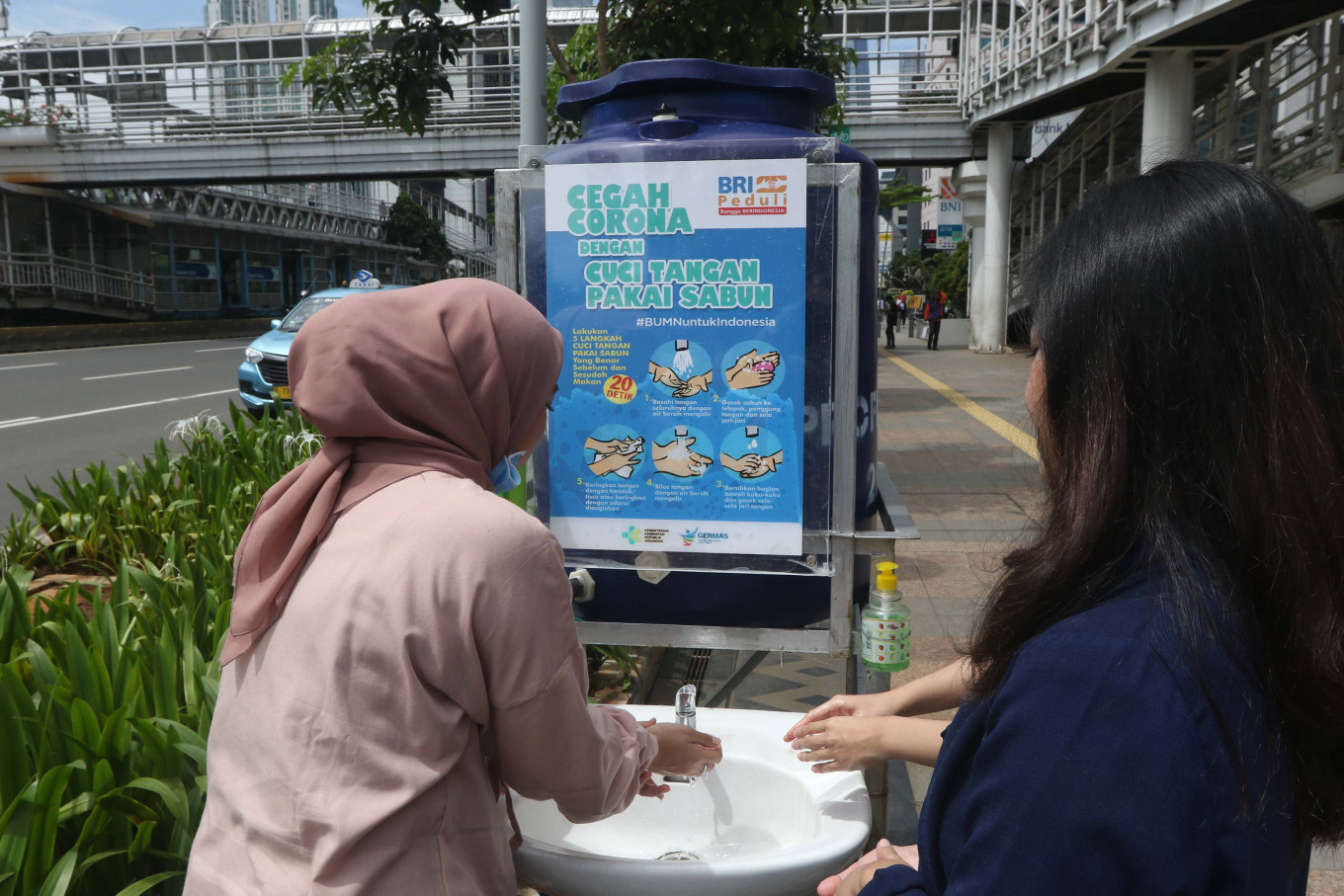Popular Reads
Top Results
Can't find what you're looking for?
View all search resultsPopular Reads
Top Results
Can't find what you're looking for?
View all search resultsHow corporations can promote hygiene through community development
The habits of washing one’s hands with soap whenever feasible, keeping distance from others in a range of settings and perhaps not spitting in public should be encouraged.
Change text size
Gift Premium Articles
to Anyone
“Hygiene is two thirds of health” is a long-standing proverb that resonates with the world today. Looking back at our lives before the COVID-19 pandemic, we can understand why our way of living helped the virus spread and proliferate.
How could the simple act of washing one’s hands with soap and wearing masks suddenly be essential now, even though we knew to do so since we were kids? This shows that we were so accustomed to our own behaviors that we were not heedful enough of a clean and healthy lifestyle.
In the 1970s the government initiated a program called PHBS or Pola Hidup Bersih dan Sehat (Clean and Healthy Lifestyle). Ever since, doctors and health workers have constantly reminded the public about the healthy living. Children began learning about these habits, including bathing, brushing their teeth twice a day and keeping their nails clean, in preschool.
This government-sponsored campaign aimed to familiarize people with a clean and healthy lifestyle to create a health-conscious community with the knowledge and awareness to live a clean and healthy life.
Now, during the COVID-19 pandemic, about 50 years after the PHBS campaign began, we are reminded about the importance of washing our hands with soap and clean water. During this unprecedented pandemic, good hygiene has become more important than ever.
Scientists have predicted that the world will have to deal with the threat for the next 18 months, until a viable vaccine can be developed and made available for public use.
Some countries have already built private sector capacity into their COVID-19 responses. For example, England, France, Germany, the Lombardy region of Italy and South Africa have used private health sector engagement to increase testing capacity and add extra hospital beds, ventilators and health workers to their response capacity.
In Pakistan, a citizen engagement program called “Clean Green Champions” has attracted 120,000 volunteers. The registered volunteers, on a self-help basis, assist in providing basic services, supporting local authorities and promoting behavioral change under Clean Green Pakistan. They also advocate behavioral change in hard-to-reach communities to control the spread of COVID-19.
Jakarta – Indonesia’s capital and a metropolitan area of about 11 million people – has various modes of public transportation to support the movement of people and goods, such as regular buses, TransJakarta buses, the Jakarta MRT and soon the Jakarta LRT, which is expected to begin operation early next year.
This means that there are many public facilities and places where hygiene is a must. The problem is that the government cannot provide them alone. As nobody knows when normal life will return, corporations could support the government through community development programs.
The programs could provide essential public facilities such as sinks, washrooms, free masks and free hand sanitizer in the transportation hubs of the city. Transportation lines are some of the most crowded sites in cities and evidence suggests that crowding, not density, contributes to the spread of COVID-19.
Such facilities are crucial considering that washing one’s hands is the very first line of defense against the virus and this basic hygiene routine is proven to drastically reduce the spread of the virus and thereby limit new cases.
Community development programs would be an effective way to sustain hygienic habits in society especially since the world will focus more on finding better ways to prevent viral infections post-pandemic. It is highly important to advise people to keep their healthy and hygienic way of living in the future. It takes initiative from corporations to participate in building an effective program.
In matters pertaining to the community development program, it is important for corporations to tailor the right messages to communities. Setting the right target groups and using the right communication channels will be two effective ways to begin.
The habits of washing one’s hands with soap whenever feasible, keeping distance from others in a range of settings and perhaps not spitting in public should be continuously encouraged.
Communication of accurate and timely information to the public hopefully will result in behavioral change, and people will sustain the hygienic lifestyle even after the pandemic is over.
True, these efforts will require deep understanding of people’s perception about their willingness and motivation to adopt hygiene in their own lives, but it is safe to say that the pandemic has provided a good momentum to convince society to value hygiene. The program, if continues, will be a world-changing experience at length.
It may not be an exaggeration that this kind of community development is uncovering the bright side of the pandemic, as people will adopt a clean and healthy lifestyle throughout the rest of their lives because they are aware such a habit will save them.
-- The author is a director and principal consultant at Kiroyan Partners










